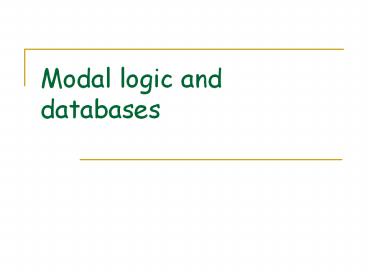Modal logic and databases - PowerPoint PPT Presentation
1 / 40
Title:
Modal logic and databases
Description:
Introduce Axiom 5. Apply the shorthand derivation. F. Instantiate ... Apply and reduce Axiom 7. Apply shorthand rule to 11. Apply disjunction rule. Instantiate ... – PowerPoint PPT presentation
Number of Views:18
Avg rating:3.0/5.0
Title: Modal logic and databases
1
Modal logic and databases
2
Terms
- Object terms
- Concept terms
- ?t object denoted by concept t in some context
- Type designations o (object) and c (concept)
3
Syntax
4
Semantics
5
Valuation
6
Truth and modal models
7
Relational databases
- Record basic unit of information in rdb
- Cant return it directly as answer to query
- Each one is a possible world
- Accessibility (i.e. proximity of possible
worlds) the S5 logic - db field attributes individual concepts
- db field entries individual objects
8
Sample database
9
Axioms
10
The worlds and mappings
Validity true in every world
11
Rigidity
- t is rigid if it always designates the same
object, no matter which world - FWIW in linguistics, proper names are rigid
- Rigidity can be relative w/rt subsets of all
possible worlds - Databases functional dependencies (e.g. between
attributes)
12
Designation
- Designation is only possible when interpretation
is grounded.
13
A query
- returns 2 and 5
14
Another query
returns t
15
Additional relation(ship)s
now add...
16
Higher-order relations
relation of type ltgtPERSON
relation of type ltgtLOCATION
17
The new (relational) constraint axioms
18
The new instance axioms
19
A sample derivation
Prove
Strategy Prove X Prove X is false
20
A shorthand derivation
21
The overall derivation
22
The strategy
Prove X is false
23
Reduce query to disjuncts
24
Introduce Axiom 5
25
Apply the shorthand derivation
F
26
Instantiate with query objects
27
?-reduce
28
Apply and reduce Axiom 7
29
Apply shorthand rule to 11
30
Apply disjunction rule
31
Instantiate
32
Contradiction! (lhs)
33
Instantiate
34
Contradiction!
35
Another example
36
Attributes and relations
37
Sample query 1
Which items have 2 cylinders?
38
Checking query 1 (for instance 3)
check the relevant world(s) with appropriate
mappings
and resolve each conjunct...
39
Sample query (2)
- What choices does a customer have when purchasing
a 4-cylinder car?
40
Sample query (3)
- What features can a customer choose that are
available for more than one product?

